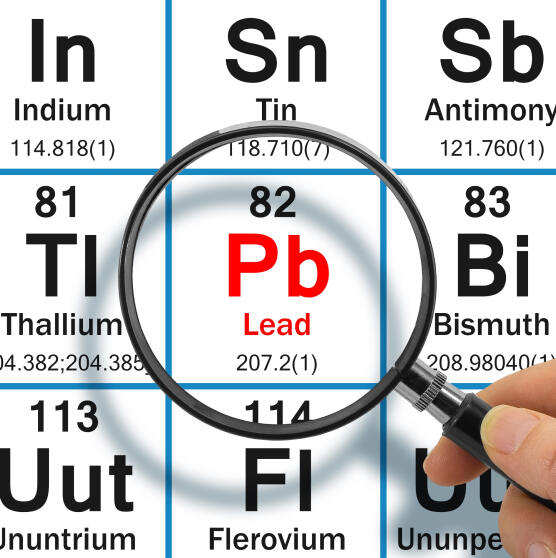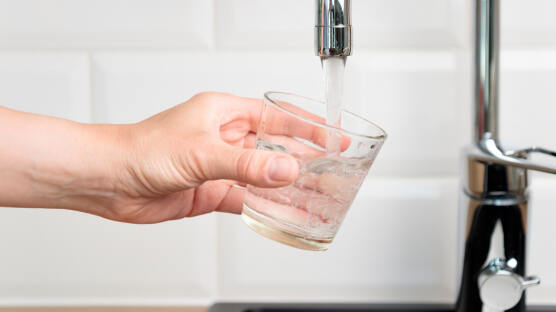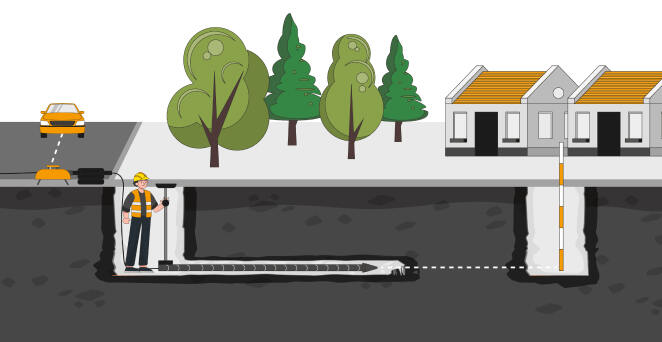As a property owner, ensuring the integrity of your water supply is a must for the health and safety of your household. If you’ve noticed low water pressure, discoloured water, frequent leaks, unusual noises in your pipes, soggy spots in your garden, or unexplained high-water bills, these could be signs that your water main needs replacing. Ageing pipes, particularly those made of lead, can pose significant risks and require prompt attention. In this article, we’ll guide you through the reasons you may need water main or lead pipework replacement and the Moling process used to carry out the job, helping you to identify warning signs and understand the necessary (and safe) steps to secure clean and safe drinking water for your home or office.
Reasons You May Need To
Replace Your Water Main
Replacing your water main and lead pipework is an important task for any property owner, especially those in older buildings. In our experience, here are the main reasons why you might need to consider this essential upgrade:
Leaking Pipes
As you may know, the term “plumbing” comes from the Latin word “plumbum,” meaning lead (hence why lead it is represented as Pb in the periodic table). Lead pipes were commonly used in early plumbing systems and many older buildings, especially those in historic areas like London, still boast their original lead pipework. Over the years, it is inevitable that these lead pipes will have become worn and fragile, leading to leaks.
In 2016, Thames Water introduced more than one million smart meters across London and the South East of England to help give people greater control over the water use and bills. They also provide Thames Water with essential data to help reduce leakage and a greater insight into exactly where the water they put into supply goes, when customers use the water and how much they use. The introduction of smart meters by Thames Water has made it easier to detect these leaks in real-time, helping homeowners address issues quickly, whether it’s a dripping tap or a hidden leak in the water main. It is said that Thames Water plans to introduce more smart meters across the Thames Valley and is aiming to have meters fitted for all suitable homes by 2035.
Oliver Osmore, Managing Director at Maintracts Services adds “detecting and notifying property owners of water leaks has never been so easy and efficient for Thames Water since they introduced smart meters. They don’t just detect leaks from the mains either, sometimes it may just be that someone has a dripping tap or a toilet that keeps filling. No matter how small or large the symptoms, Thames Water can see it on their system and flag it to the homeowner quickly.”

Reduced Water Supply
Upgrading your internal plumbing system from a gravity-fed system to a mains-fed system, such as installing a combi boiler or Megaflo, requires good water pressure and flow. Many homeowners find that their new systems don’t work as efficiently as expected due to an old, dilapidated water main. Upgrading the water main alongside these plumbing improvements ensures optimal performance and reliable water supply.

Health Concerns
Lead pipes pose a significant health risk, even though years of use may have caused scale build-up, reducing direct contact between the water and the lead. Nevertheless, the thought of drinking water that has passed through lead pipes is unsettling for many. Replacing lead pipes with plastic provides peace of mind and ensures safe, clean drinking water for your household. Plus, it will go a long way in improving water pressure and flow of water to the property too.
If you’re experiencing any of these issues or are considering plumbing upgrades, it’s wise to consult with professional plumbers in London to evaluate and replace your water main and lead pipework.
How Is a Water Main
Replacement Conducted?
An expert plumber will typically follow the following process in the event of a water main replacement or repair:
1
Initial assessment: A professional plumber will inspect the existing water main to determine the extent of the damage and the best approach for replacement. Typically, the plumber will use special equipment called a Moling machine which is by far the most unobtrusive technique.
2
Permits and notifications: Necessary permits are obtained from local authorities, and residents are notified about the planned work and any temporary water shutoffs. For example, if the mains water valve is sited on public pavement, you will need to request planning permission from the local council to dig up the area and carry out the works. Generally, you are able to dig up on your side of the boundary wall, but it always best to check with your local council.
If your water is supplied by Thames Water, please ensure you use a TAPS 5 registered plumber, like the team at Maintracts Services, to carry out a water mains replacement or lead pipe replacement on your property to ensure the works are TAPS 5 certified. See below for more information on TAPS 5 scheme.
3
Excavation: The area around the old water main is excavated, typically using digging equipment, to access the pipes. Typically, a plumber will conduct Water Pipe Moling to carry out repairs to, or replacement of a water mains or lead pipework.
Moling is normally the most unobtrusive technique as it means you don’t have to dig a trench up from the pavement or wherever your mains valve is located, to the front of the property. Instead, state-of-the-art the Moling equipment can quickly bore accurate, efficient piping routes for new pipe work or replacement water mains without the need for a large-scale excavation works. Once the trenchless holes and tunnels have been created by the Moling technology, a pneumatically driven machine known as a mole forces its way through the soil along the desired path of the path. The new or replacement pipework can then be pulled through easily from both ends.
Oliver Osmore adds: “When you are replacing the water main and relating pipework, the original lead piping would not necessarily be removed as it could be too time consuming. It is likely that the pipework would be cut and left redundant in the ground. The Moling machine will ensure your new plastic pipe follows the same route from the mains water valve on the pavement into wherever it comes into the property. In most properties, the water pipe comes in underneath the front door, or maybe under the living room floor if you have a bay window.”

4
Shut off water supply: The water supply is temporarily shut off to prevent flooding and ensure safety during the replacement process.
5
Removing old pipes: The old, damaged pipes are carefully removed. This may involve cutting and dismantling sections of the existing water main.
6
Installing new pipes: New, durable pipes (often made of materials like PVC) are installed in place of the old ones. Connections are securely fitted to ensure no leaks.
7
Pressure testing: The new water main is tested for pressure and leaks to ensure it functions correctly.
8
Backfilling and restoration: Once the new pipes are verified, the excavation site is backfilled with soil, and any disturbed areas (such as roads, driveways or lawns) are restored to their original condition.
9
Reconnecting water supply: The water supply is turned back on, and the system is checked again to confirm that everything is working properly.
10
Final inspection: A final inspection is conducted to ensure the replacement meets all regulatory standards and functions efficiently. Your plumber will then issue you the necessary certification to certify their work meets the required standards.

TAPS 5 Approved Plumber
If your water is supplied by Thames Water and you need your mains water or external pipework replaced or repaired, it’s crucial to ensure your plumber is TAPS 5 approved.
The Thames Water Approved Plumbing Scheme (TAPS) ensures that plumbers, like us, are registered and supervised under the scheme. This means we are authorised to perform works on Thames Water’s behalf and can issue a certificate of compliance upon completion.
TAPS 5 specifically covers works involving underground supply pipes from an outside stop valve or boundary to an inside stop valve.
As TAPS 5 approved plumbers, we are authorised to replace the water main from the external valve (usually located on the pavement) into your property. This allows us to complete and certify the work ourselves, without requiring Thames Water to inspect and certify it.
Leaking Pipe Repair
Having leaking or burst pipes can form to create problems in your property which can turn into a disaster if not taken care of quickly and effectively. We work with state-of-the-art leak detection to find the precise location of the leakage and repair/replace the pipes without the need to cut out trenches by making use of Moling technology.
Whether you are in need of a water Mains Replacement, Leaking pipe repair or an emergency plumbing service in London, our fully qualified (and TAPS 5 approved) team of plumbers can help. Check out our customer reviews for reassurance, or simply contact us direct to chat through your requirements.

